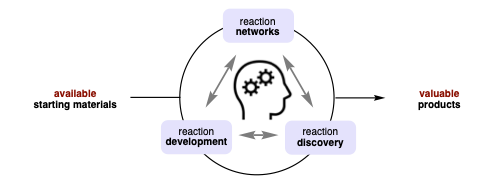
University Assistant Professor
PhD Opportunities
We welcome motivated and creative candidates interested in joining the Dydio Lab to pursue a PhD starting in October 2026. For further information about available projects and application procedures, please contact pd552@cam.ac.uk.
Research
The Dydio group is researching new ways to improve the efficiency and capacity of organic synthesis.

Areas of interest include:
- Complex Networks of Reactions
- Mechanism-based design of new transformations
- Advancing key industrial processes driven by elucidating their mechanistic features
Watch Dr Dydio discuss his research
Publications
Abiological catalysis by artificial haem proteins containing noble metals in place of iron.
Nature
(2016)
534
534
(doi: 10.1038/nature17968)
Cofactor-Controlled Chirality of Tropoisomeric Ligand
Organometallics
(2016)
35
1956
A hybrid macrocyclic anion receptor exploiting the pyrrole-2,5-diacetamide unit
RSC Advances
(2016)
6
41568
(doi: 10.1039/c6ra05804c)
Beyond Classical Reactivity Patterns: Hydroformylation of Vinyl and Allyl Arenes to Valuable β- and γ-Aldehyde Intermediates Using Supramolecular Catalysis
J Am Chem Soc
(2014)
136
8418
(doi: 10.1021/ja503033q)
Scalable and chromatography-free synthesis of 2-(2-formylalkyl)arenecarboxylic acid derivatives through the supramolecularly controlled hydroformylation of vinylarene-2-carboxylic acids
Nature protocols
(2014)
9
1183
(doi: 10.1038/nprot.2014.077)
Supramolecular control of selectivity in transition-metal catalysis through substrate preorganization
Chem. Sci.
(2014)
5
2135
(doi: 10.1039/c3sc53505c)
Selective Isomerization–Hydroformylation Sequence: A Strategy to Valuable α-Methyl-Branched Aldehydes from Terminal Olefins
ACS Catalysis
(2013)
3
2939
(doi: 10.1021/cs400872a)
Precise supramolecular control of selectivity in the Rh-catalyzed hydroformylation of terminal and internal alkenes.
Journal of the American Chemical Society
(2013)
135
10817
(doi: 10.1021/ja4046235)
Supramolecular Control of Selectivity in Hydroformylation of Vinyl Arenes: Easy Access to Valuable β‐Aldehyde Intermediates
Angewandte Chemie International Edition
(2013)
52
3878
(doi: 10.1002/anie.201209582)
Supramolecular Control of Selectivity in Hydroformylation of Vinyl Arenes: Easy Access to Valuable β‐Aldehyde Intermediates
Angewandte Chemie
(2013)
125
3970
(doi: 10.1002/ange.201209582)
- ‹ previous
- Page 4

